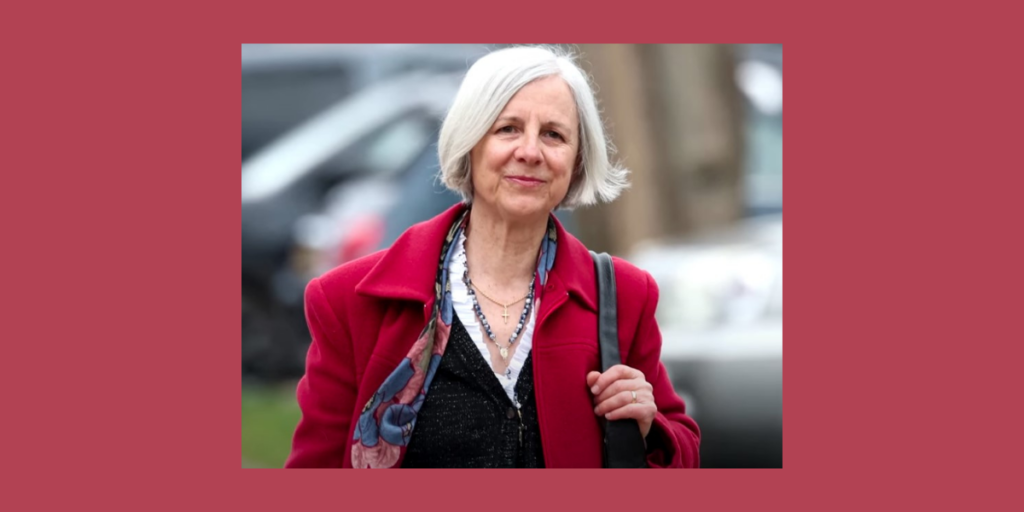
The U.K.’s Abortion ‘Buffer Zone’ Tyranny Is Buffeting Free Speech
By: Kristen Waggoner, originally published April 8, 2025, the National Review
As censorship mounts, Britain must decide whether it will continue down this authoritarian path or reclaim its role as a defender of basic liberties.
Livia Tossici-Bolt, the 64-year-old retiree who held a sign outside an abortion clinic in the United Kingdom with the words, “Here to talk, if you want,” has been convicted. On Friday, a magistrate
court found her guilty of violating a “buffer zone” around the facility in Bournemouth and ordered her to pay £20,000. Her conviction comes days after the U.S. State Department, in a rare step, said it was “monitoring” her case out of concern for freedom of speech; it now says it is “disappointed” in the court’s decision.
What was Livia’s “crime”? Standing within 150 meters of an abortion facility, where any form of “approval or disapproval” of abortion is prohibited. But she did nothing more than offer consensual conversation. Her motivation to go out on the street with her sign followed Covid lockdowns during which social interaction was restricted. Since doing so, she has had countless positive interactions with people on all manner of subjects. She’s even been invited over for tea.
A retired medical scientist, Livia holds firm convictions that every life matters. And she is happy to take the time to talk to anyone in a difficult situation, including those weighing abortion. For supposedly breaching Bournemouth’s draconian “buffer zone,” Livia was fined and prosecuted.
Because she committed no wrongdoing, Livia declined to pay the fine and was dragged through an onerous trial on March 5 and 6. Taking the witness stand, the officers involved in the incident said they couldn’t recall any complaints from members of the public that they had suffered harassment due to Livia’s presence. Clearly, her targeted prosecution wasn’t about any legitimate threat to women.
In the days leading up to the verdict, the U.S. State Department weighed in on X: “We are concerned about freedom of expression in the United Kingdom. . . . We are monitoring [Livia’s] case.” It further emphasized: “U.S.-UK relations share a mutual respect for human rights and fundamental freedoms. It is important that the UK respect and protect freedom of expression.”
Additionally, one source familiar with U.S.–U.K. trade negotiations reportedly said, “No free trade without free speech,” implying that the outcome of Livia’s case could impact the fate of a bilateral trade deal.
These responses reflect a vital piece of U.S. foreign policy — free-speech diplomacy. Championing free speech abroad is core to the American national interest. Democracy cannot exist without the freedom to speak, think, and dissent. And a world with fewer functioning democracies is a more volatile, dangerous place — especially if once-stable allies like the U.K. and Europe continue the slide toward authoritarianism. If the U.K. falls, and if the broader West abandons free speech, America will stand alone.
The State Department’s response to Livia’s case signals that the U.S. recognizes freedom of expression as a nonnegotiable. It goes beyond defending an individual; it’s defending a principle. Vice President JD Vance captured this spirit when he recently said, “We can rebuild the kind of society where virtue and freedom and our ancient liberties are preserved and enforced and facilitated by our government rather than torn down by our government.”
That’s not just rhetoric — it’s a blueprint for how democracies survive and regenerate.
The fact that the Trump administration spoke up at this critical moment shows how far the U.K. has drifted from its commitment to basic liberties. “Buffer zones” have been introduced across all of England and in Wales, Scotland, and Northern Ireland. The vague language and sweeping scope surrounding these zones have allowed authorities to conflate peaceful presence — even silent prayer or the offer of a conversation — with unlawful activity. Livia’s case is just the latest example of this dangerous overreach.
Vice President Vance didn’t mince words when he raised the U.K.’s “buffer zones” at a recent speech in Munich. Citing the convictions of individuals like Adam Smith-Connor — an army veteran convicted at the same Bournemouth court as Livia for silently praying near an abortion facility — the vice president highlighted the disturbing trend of mounting censorship in the U.K. and across Europe. These are not fringe incidents. They are the logical outcomes of a society that prioritizes ideological conformity over protection of fundamental freedoms.
In Scotland, a 74-year-old woman, Rose Docherty, faces legal jeopardy after holding a sign near a hospital that read, “Coercion is a crime, here to talk, only if you want.” Once again, a calm and nonconfrontational offer to speak was treated as a potentially criminal act.
Supporters of “buffer zones” argue that they are necessary to protect women from intimidation, but the U.K. already has laws in place that do exactly that. “Buffer zone” laws go much further. They give authorities the power to criminalize innocent individuals, opening the door to ideologically motivated prosecutions.
Livia’s conviction will add to steadily rising international scrutiny of the U.K. The image of a senior scientist punished for simply offering a conversation has rightly become a flashpoint in the battle to protect fundamental freedoms. It reveals how illiberal the U.K. has become in its quest to protect people from views deemed uncomfortable.
It remains to be seen how the U.S. will respond to Livia’s conviction, but any backlash should serve as more than a diplomatic embarrassment. It should be a wake-up call. Our democracies are strongest when they can tolerate peaceful disagreement and open debate. Criminalizing those who offer a conversation is not a show of strength. It is a confession of fear — fear that dissent, however mild, might still change minds.
As censorship mounts, Britain must decide whether it will continue down this authoritarian path or reclaim its role as a defender of basic liberties.
Kristen Waggoner is the CEO, president, and general counsel of Alliance Defending Freedom.
